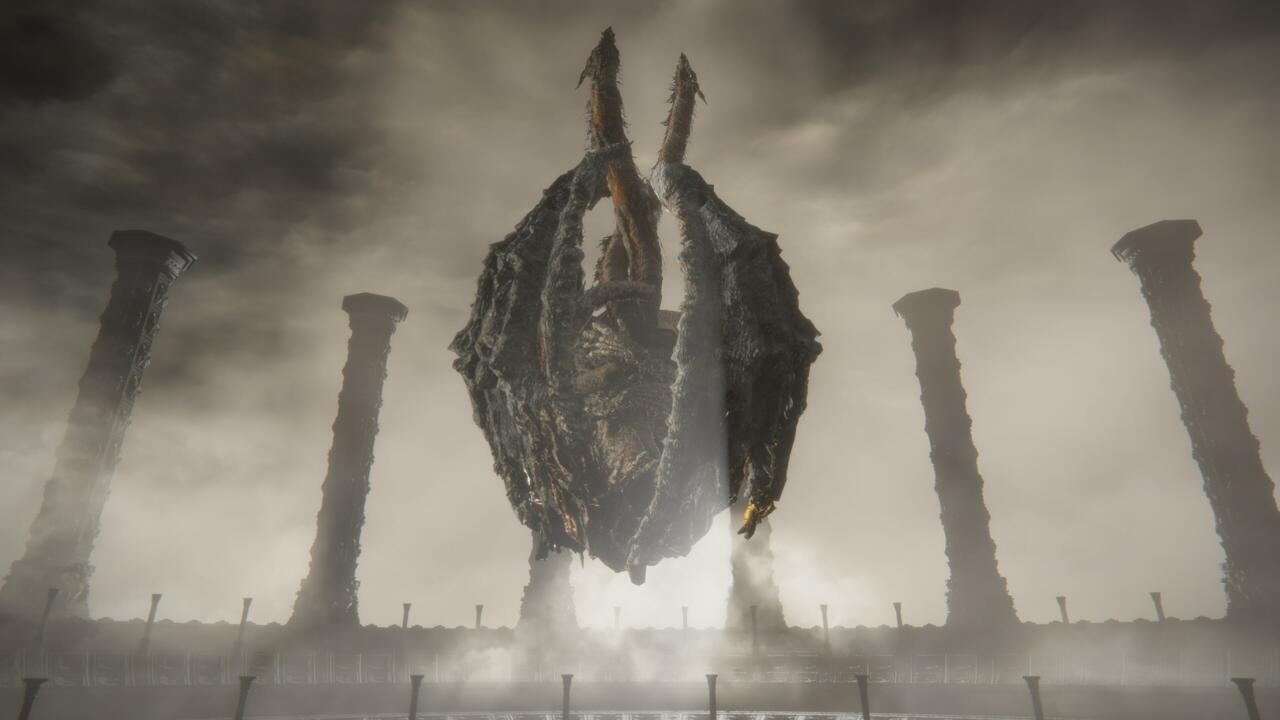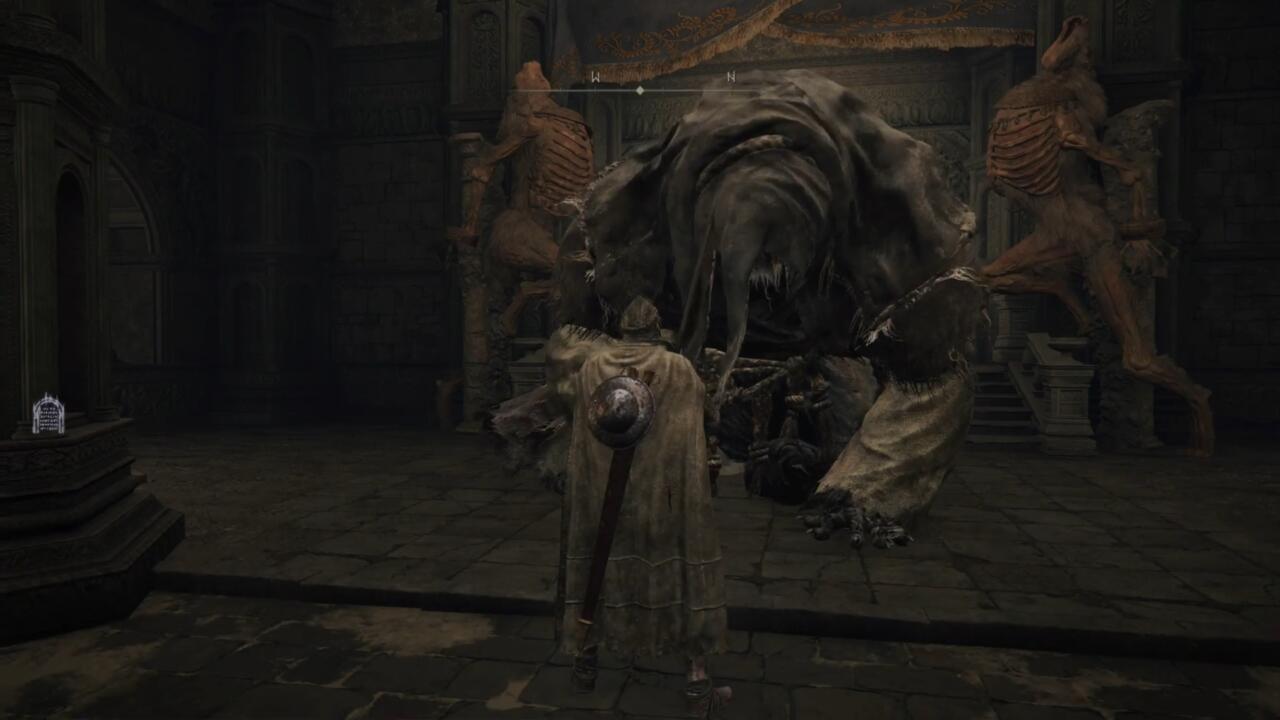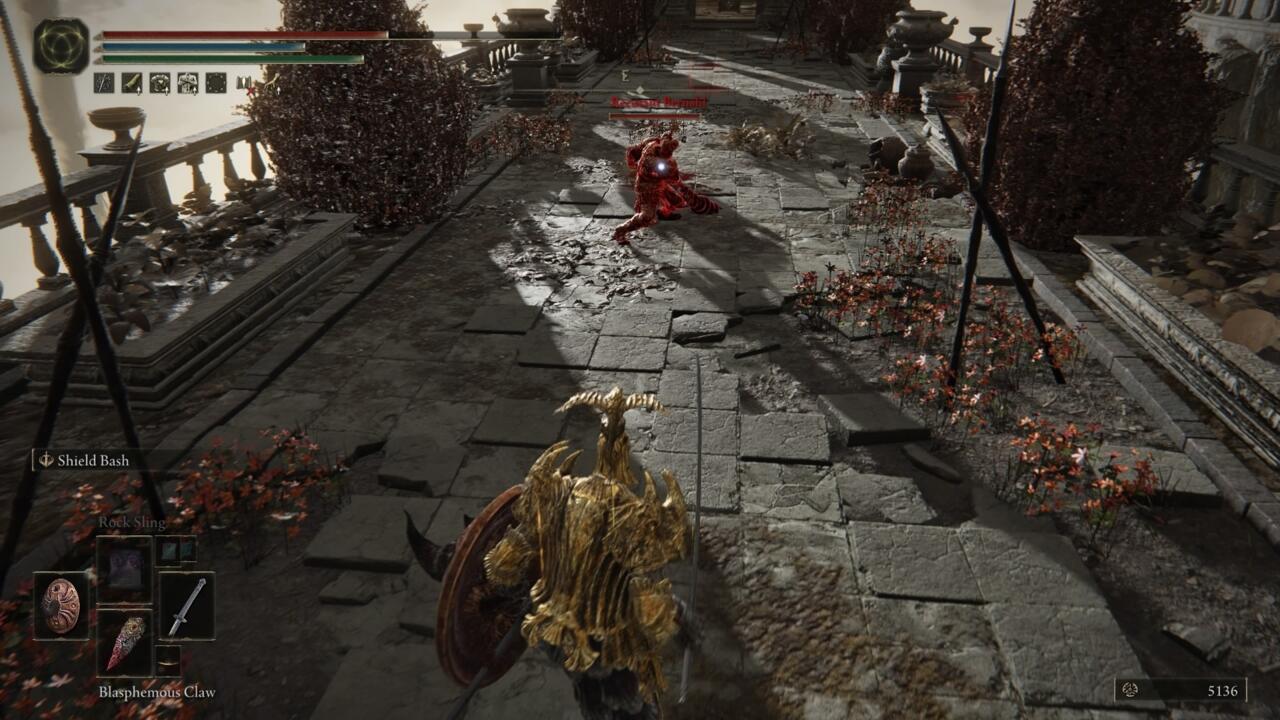Finally, it's time. We've bested all the demigods in Elden Ring, explored the entire world of the Lands Between, delved into the depths beneath the land and their history, and learned all we can about the Outer Gods. It's time to finally stand before the Elden Ring and become Elden Lord.
Unfortunately, there are still several people standing in our way, trying to keep that from happening. Shocking, I know.
With a handful of Great Runes in our possession, we have almost everything we need to repair the Elden Ring. But if we've learned nothing else from our experiences in the Lands Between, witnessing the horrors and stagnation created by the Golden Order and the demigods, and from our stalwart companion Melina, it's that removing Destined Death from the Elden Ring was a mistake. This is a story about death, after all. We've been dealing out death all over the Lands Between. It's time to restore it as a natural part of the world. To do that, we have to head to the strange mausoleum city of Crumbling Farum Azula.
As always, there are a ton of spoilers to follow.
More Elden Ring story explainers
- Elden Ring Story Guide: The Lore and History of The Lands Between
- What Happens in Elden Ring? The Game's Story, Part 1: Limgrave
- What Happens in Elden Ring? The Game's Story, Part 2: Liurnia Of The Lakes
- What Happens in Elden Ring? The Game's Story, Part 3: Caelid
- What Happens in Elden Ring? The Game's Story, Part 4: Mt. Gelmir and Volcano Manor
- What happens in Elden Ring? The Game's Story, Part 5: Leyndell, Royal Capital
- What Happens in Elden Ring? The Game's Story, Part 6: Mountaintops of the Giants
- What Happens in Elden Ring? The Game's Story, Part 7: Castle Sol and the Consecrated Snowfield
- What Happens in Elden Ring? The Game's Story, Part 8: Miquella's Haligtree
- What Happens in Elden Ring? The Game's Story, Part 9: Eternal Cities, Deeproot Depths, And Mohg
- What Happens In Elden Ring? The Game's Story, Part 11: Leyndell, Ashen Capital
- What Happens In Elden Ring? The Game's Story, Part 12: Becoming Elden Lord
- The Frenzied Flame and the Game's Bleakest Ending, Explained
Farum Azula, seat of the dragons
After kindling the Flame of Ruin with Melina, fulfilling her purpose (and, perhaps, the plans of Marika--we'll get there), you find yourself awakening in Crumbling Farum Azula. This is a city literally floating in the air, but also in an endless state of disintegration. The place itself makes little or no sense, and it's hard to say exactly what's going on here.
What lore we can glean about Farum Azula is that it's an ancient city, existing outside the normal flow of time. It's also a mausoleum meant to honor an ancient dragon, which seems to be Dragonlord Placidusax, since you can find and fight the two-headed monster dragon as an optional boss as you make your way through here. (To access him, though, you have to lay down and get pulled into a strange tornado--this moment seems to suggest that to find and take on Placidusax, you have to take some kind of magical pathway, possibly involving time travel, to reach the Dragonlord.) It sounds like Farum Azula could be the ancient home or birthplace of the dragons before they made their way to the Lands Between. It's also home to the beastmen, who you might have encountered here or there. Gurranq, the Beast Clergyman, is seemingly one of these, and it seems very possible that Blaidd, the wolf-man raised as Ranni's brother who acts as her "shadow," is another. The beasts have their own religion, they forge weapons the likes of which are beyond human understanding, and they seemingly protect and serve the dragons, at least to some extent.
Farum Azula gives us a look into the past of the Erdtree and the Golden Order that we've only seen hinted at in other places. First, we learn here from the Remembrance of the Dragonlord that, in the age before the Erdtree, Placidusax served as Elden Lord. Generally, the title of Elden Lord seems to only be applied in relation to the Elden Ring and the Greater Will--which suggests that Marika is perhaps not the first god chosen by the Greater Will to serve it in the Lands Between. Placidusax is also implied to have been immortal, "unlike the paltry dragons of today."
It's tough to say exactly what happened to Farum Azula and where it fits into the world of the Lands Between, but we can freely speculate with some of the associations, so here's what I think is the deal with Farum Azula. Before the age of the Erdtree--which Marika established by defeating the giants and their Fell God--there was the age of the dragons. Placidusax, Elden Lord among the dragons, ruled from Farum Azula, a city that existed beyond time. Because of that, like Marika after she removed Destined Death from the Elden Ring, Placidusax was immortal. That immortality guaranteed that the Greater Will's agents would be in place to run (most of, or at least part of) the Lands Between forever, while still leaving Destined Death in place to allow death to happen naturally in the world, something a lot of characters suggest was very important. Removing Destined Death from the Elden Ring seems to have been the start of all the problems that led the Lands Between to the state we find them in today.

At some point, however, Farum Azula was attacked, perhaps by a cosmic creature similar to Astel, Naturalborn of the Void, or through the machinations of another Outer God. The Ruins Greatsword says it came from a ruin that "crumbled when struck by a meteorite," and the use of the word "crumbled" to talk about ruins feels pretty specific--that word only seems to appear in any lore entries that are related to Farum Azula. The sword also seems to resemble the aesthetic of the buildings in Farum Azula. Again, we're speculating, but even though Farum Azula has been crumbling "from time immemorial," it sounds like it got walloped by a meteorite at some point. The Placidusax's Ruin incantation, meanwhile, says the spell is made up of "the dying wails of the Dragonlord who once dwelled eternal beyond time." Finally, the Remembrance of the Dragonlord says that Placidusax's god "fled," and the dragon awaited its return.
As mentioned, that's a speculative interpretation. It's also possible that Elden Lord exists as a concept or title free of the Greater Will, and the god that fled is a different outer god, much in the same way that the giants worshiped an outer god of their own. If that's the case, then perhaps Farum Azula was attacked by the Greater Will itself. As we'll see in Part 12, the lore says the Greater Will sent a star to the Lands Between; maybe that was the meteorite that struck the dragons' home and ended their reign. My personal interpretation, though, is that Elden Lord is a title specific to the Greater Will, and that the dragons were the first race it chose to rule the Lands Between.
So taken all together, we can guess that Farum Azula got nailed by a meteorite, an attack from an outside force. Placidusax was Elden Lord, which means he was consort to a god, just like Godfrey was Elden Lord to Marika--and that god fled from the attack, though we have no idea who or what it was or where it ended up (although there's a compelling theory on this, which we'll get to). With the dragons' home devastated and their Elden Lord ravaged, the Greater Will looked for a new god to run the Lands Between. That god would be Marika, marking the start of the Golden Order and the era of the Lands Between that we know.
This line of thinking fills in a lot of potential gaps. Remember back in Part 5, when we discussed the ancient dragon cult of Leyndell? People worshiping dragons makes more sense if you consider the dragons had a god and an Elden Lord before the rise of Marika. And the dragons getting abandoned by the Greater Will and losing their claim to power, as it seems probably happened, provides a pretty good motivation for the great dragon Gransax to attack Leyndell, home of those the Greater Will now favored, triggering the war in which Godwyn fought and defeated them.
The beastmen, too, make a pretty good case for Farum Azula to be the first seat of power for the Greater Will. According to Ranni, all of the Empyreans chosen by the Two Fingers get a "shadow," a beastman protector. Also according to Ranni, if any Empyrean goes against the Greater Will, those beastmen become "baleful shadows," assassins meant to hunt and eliminate their Empyreans to stop them. If you follow Ranni's storyline to its conclusion, you see this happen to Blaidd; he loses his mind and becomes hostile, even as his dialogue suggests he doesn't believe that to be possible. Blaidd's transformation into a baleful shadow happens against his will, suggesting he's under the control of the Greater Will. It sure sounds like the Greater Will instituted a failsafe with these shadows, to ensure that no Empyrean would ever try to go against it--suggesting that perhaps such an insurrection happened in the past.
We know Marika had a beastman shadow, in fact, and meeting him is your goal in Farum Azula.
Maliketh, the Black Blade

When you make your way to the top of Farum Azula, you encounter Gurranq, the Beast Clergyman. If you've been helping Gurranq find Death Root all this time, he'll recognize you and haltingly ask why you've come here in search of Destined Death, before attacking you. What we learn here is that Gurranq is none other than Maliketh, Marika's shadow and keeper of the Rune of Death. Maliketh's story is one of the most tragic in the game: He's been trying to correct a mistake that wasn't his fault since before the Shattering.
First, some history about Maliketh. Marika's shadow served her when she was an Empyrean, and like Ranni and Blaidd, the two were so close that Maliketh is considered Marika's adoptive brother. However, we learn from lore related to Maliketh that Marika didn't have much use for the shadow, except for one particular way: to be keeper of the Rune of Death. When Marika removed Destined Death from the Elden Ring, she charged Maliketh with its protection.
That made Maliketh a force to be feared even by the demigods, as the only person in the Lands Between who could wield Destined Death. Marika's move to remove the Rune of Death from the Elden Ring seems like it spawned some disagreement, however. We're once again moving into the realm of speculation, but it seems that one group that potentially disagreed with Marika on this point were the Godskin Apostles, a group you've run into a few times through the course of Elden Ring, and will find in Farum Azula, too.
As usual, it's tough to say exactly what the deal is with the Godskin Apostles. Lore related to Maliketh says that he defeated the Godskins with Destined Death; they previously wielded the power of Destined Death through their magical Black Flame, a power capable of killing gods--but when the rune was removed from the Elden Ring, the Black Flame lost its potency. Maliketh defeated the godskins, and their leader, someone we know only as the Gloam-Eyed Queen or Dusk-Eyed Queen. This queen was said to be an Empyrean herself, and wielded the Black Flame power, but we don't know what happened to her after she was beaten by Maliketh.
YouTuber Smoughtown has a great video speculating on the whole deal with the Godskins and the Gloam-Eyed Queen.
For my part, I agree with Smoughtown that the Godskins were pro-Destined Death, hence the very word "Godskin," and that when Marika changed the rules of death in the Lands Between, the Godskins came for her. What Godskins we still find in the game are the remnants of that order, buddying up with people like Rykard, searching locations like the Caelid Divine Tower, and making their way through Farum Azula in hopes of reclaiming Destined Death and beating the demigods themselves.
With Destined Death under the control of Maliketh and the Godskins defeated, Marika was free to usher in the era of the Golden Order. But on the Night of Black Knives, part of the Rune of Death was stolen from Maliketh, somehow, and used to create the blades of the demigod-slaying Black Knives. The assassins then used that power against Godwyn, a horrible occurrence that Maliketh never forgave himself for.
Rather than just holding onto the Rune of Death, at that point, Maliketh buried it within his own body and it became part of him, as he vowed that the Rune would never be taken from him again. Donning the more anonymous identity of Gurranq, Maliketh started working with Golden Order fundamentalists to clean up the mess he believed he'd made through his negligence, dispatching warriors to kill Those Who Live in Death. The undead were an affront to the Golden Order, but more than that, they were directly created because of Maliketh's failure and Godwyn's death. Maliketh dedicated himself to eliminating the Deathroot from the Lands Between--he literally eats it--and the abominations it created, and in so doing, became addicted to Deathroot, even sometimes losing control of himself because of its influence.
Though Maliketh seems to blame himself for what happened on the Night of Black Knives, it's possible to learn who was actually behind it. In Rogier's quest line, you can help him determine that it was Ranni who orchestrated the Night of Black Knives, and if you complete quest lines related to Rykard and Bernahl, one of his followers, you learn what his part in the affair was, as well. If you follow his quest line, Bernahl appears in Farum Azula and attacks you, seemingly on his way to try to claim Destined Death for himself.

When you defeat him, he drops an item called the Blasphemous Claw, which you can use to parry Maliketh's Destined Death attacks during his boss fight--an incredible ability with the power to defeat the keeper of Destined Death. The lore on the Blasphemous Claw says that it was given to Rykard by Ranni "on the night of the dire plot," and suggests that the idea was that Rykard could use the item as a last resort to challenge Maliketh. All that suggests that the Night of Black Knives was an expansive plot of Ranni's to gain power, and that Rykard was involved, which makes sense given how many of those disembodied hands, the Fingercreeper enemies, we've found at key places like the Mountaintops of the Giants.
When you finally meet Maliketh, you first face him as Gurranq, but once you do enough damage, he reveals his true identity as Marika's shadow. He also pulls out the Black Blade, the sword made of Destined Death he presumably used to defeat the Godskins. But as always, you eventually defeat Maliketh, allowing you to claim the Rune of Death from him.
The Rune of Death is the last piece you needed. It's time to return to Leyndell and enter the Erdtree. Read on in Part 11.

